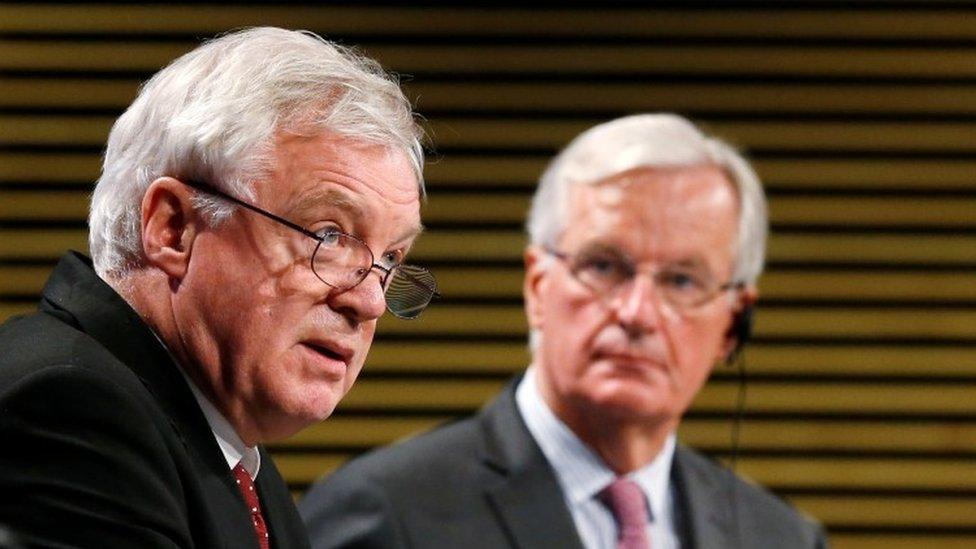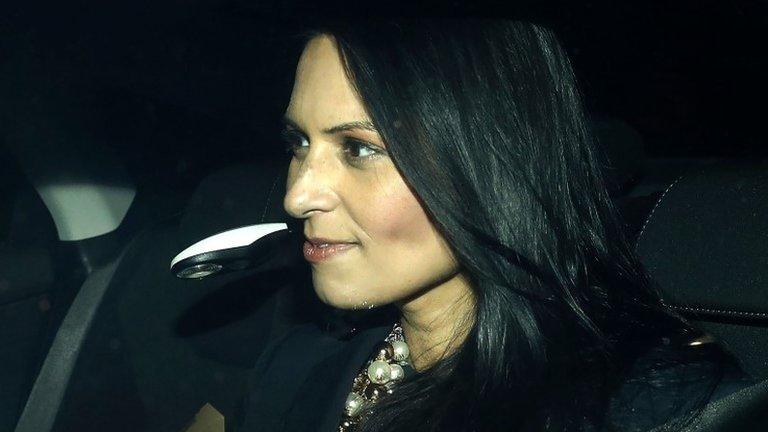Brexit: Michel Barnier says 'time pressing' as talks resume
- Published
- comments

EU negotiator Michel Barnier has told the UK "time is pressing" to get a deal on a divorce bill, as Brexit talks resumed in Brussels.
Mr Barnier said "the moment for real clarity" from the UK was approaching.
EU sources have told the BBC the UK has only two weeks left to make progress on so-called withdrawal issues.
A major stumbling block remains the amount the UK will pay as it leaves, as well as the rights of EU citizens in the UK, and UK citizens in the EU.
Without agreement in these areas, and the Northern Ireland border, EU leaders are unlikely to vote at their December summit to widen talks to include trade and transition deals as the UK wants, sources say.
Mr Barnier, who is in Rome to make a speech to Italian politicians, tweeted "it's high time to clarify the essential principles" of an exit deal with the UK.
He will meet UK Brexit Secretary David Davis for a sixth round of negotiations on Friday, with talks being conducted by their officials on Thursday.
'Bit rich'
It comes as European leaders are reportedly concerned about the instability of the UK government, as Theresa May lost a second cabinet minister in seven days.
According to The Times, European Union leaders are preparing for the possible "fall of Theresa May before the new year" and either "a change of leadership or elections leading to a Labour victory".
Former Conservative leader Iain Duncan Smith said it was "a bit rich" for EU leaders to suggest Mrs May's position was precarious, at a time when the Netherlands and Germany faced difficulties forming governments, there was "chaos" in Italy and arrests of Catalonian separatists in Spain.
He told BBC Radio 4's Today programme the government's lack of a Parliamentary majority meant it would be "a bit bumpy at times" but Mrs May's position was secure.
"I think Theresa May is the one person that can actually still unite the cabinet, unite the party, and make sure that whilst we are leaving the European Union, the party itself stays at ease with her domestic agenda," he said.
Citizens' rights
The UK government has, meanwhile, published updated proposals, external on how the rights of EU citizens in the UK will be protected, as it claimed "real progress" had been made in this area.
EU citizens would be granted a statutory right of appeal if their application to stay in the UK after Brexit is rejected - and the cost of applying for settled status would be kept to "no more than that of a British passport".
But the UK proposal was criticised by the European Parliament's Brexit negotiator Guy Verhofstadt, who said he wanted the application to be cost-free and near-unconditional.
"We don't recognise reports suggesting that a deal on citizens' rights is almost finalised. There are still major issues that have to be resolved," said Mr Verhofstadt on Wednesday.
The UK is due to leave the EU at the end of March 2019 after a referendum in which 51.9% of people voted in favour of Brexit.
The two sides have said they are in favour of a transitional phase lasting around two years to smooth the way to relations with the UK outside the EU, but they are also doing preparatory work in case no agreement is reached and the UK leaves without any deal in place.
- Published9 November 2017
- Published9 November 2017
